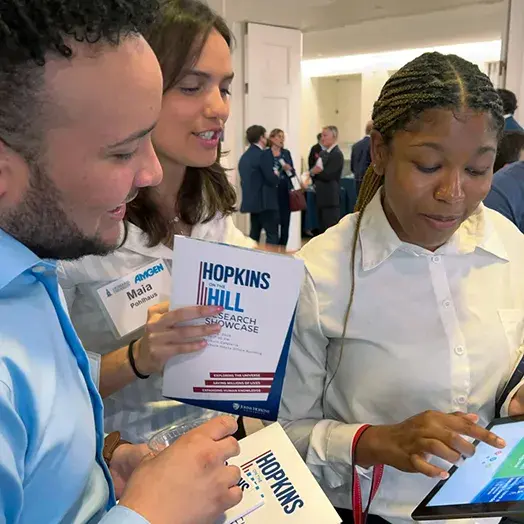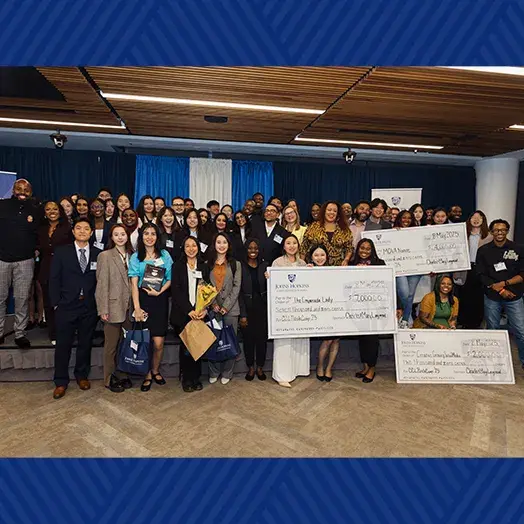The Center for Digital Health and Artificial Intelligence showcases the power of AI and how its advancement can improve individuals' daily health care needs with direct, real-time support.

Can AI provide real-time health care support?
Today’s artificial intelligence and new technologies are a far cry from the kind of accelerated tech brought to life in the sci-fi cyberpunk novels of William Gibson. While some of today’s research shows us a glimpse of Gibson’s future—embodied AI robotic dogs, advanced medicine, and autonomous AI—much of the current research focuses on using advancing technology to address the now: health care, energy efficiency, education, and safety. In the fields of health care and the business of health, AI developments are implemented rapidly, including the work of faculty, staff, and students at the Johns Hopkins Carey Business School, who leverage AI to explore ways to improve the human experience and empower professionals and patients across the industry.
Hopkins on the Hill, launched in 2017 and held this year on June 11, offers a small window into this world through the work of researchers from the Johns Hopkins University community to D.C. and the halls of power. Across from the Capitol building, in the Rayburn building, a gathering of young professionals, college students, and lanyard-wearing D.C. workers mingled, warmed by their overlapping dialogue and the live jazz. Tables lined the perimeter of the room, sharing recent research from Johns Hopkins. This year’s event showcased 42 presenters sharing 20 federally funded projects, research, and programming.
Co-director of the Center for Digital Health and Artificial Intelligence and Carey Business School Professor Gordon Gao and doctoral student Junjie Luo joined the event to present research on AI innovations in health care. Attendees circled the room and found their way to CDHAI’s table. They were accompanied by CDHAI staff Rui Han and Tianli Xu, who helped distribute the blue teddy bears—a prize for attendees who engaged with a game on their tablet—and showcased the research.
Over the wall of sound—conversations and jazz—Luo explained how the work is both personal and professional, and shared insights on the importance of real-time self-maintenance for diabetes patients, like his father.
“We need a more powerful tool. It’s hard for patients to gather feedback on their body,” Luo said.
Supported by the National Institutes of Health and the Agency for Healthcare Research and Quality, the research showcases how AI can offer solutions for early ADHD diagnosis in children, diabetes risk assessment using electronic health records, and foundation models for wearable sensor data. The research helps reduce the burden on health care providers and empowers health care seekers to make decisions that can make their lives better.
What to Read Next

student experience
CCL manifests Carey’s commitment to Baltimore businesses“This work showcases the transformative potential of AI in improving health outcomes across a range of pressing challenges,” Gao said.
Gao and his team are also establishing AI for Health Research labs nationwide with over 30 institutions participating, fostering groundbreaking research and creating an AI workforce equipped to drive AI innovation in healthcare.
“[The] CDHAI team is building large health models that enable personalized, timely, and scalable interventions,” Gao said. “What’s more, through the AIM-AHEAD PAIR program, we are actively advancing national AI-for-health research capacity by training and mentoring emerging investigators from institutions beyond Hopkins.”


